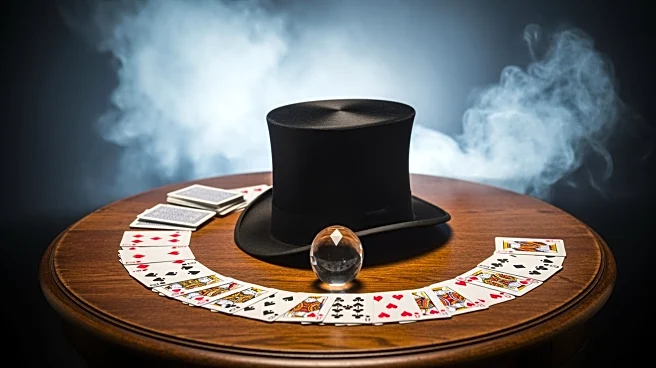What's Happening?
The third installment of the 'Now You See Me' film series, titled 'Now You See Me: Now You Don't,' features Jesse Eisenberg leading an expanded team of magicians known as the Four Horsemen. This time, they are joined by three next-generation illusionists
who are social-activist magicians. The plot revolves around a heist to steal the Heart Diamond, the largest diamond in the world, owned by Veronika van der Berg, a South African magnate. The film combines elements of action, crime, and magic, creating a hybrid genre that entertains audiences with sleight-of-hand deception. The movie opens with a reunion show in Brooklyn, where the original Horsemen are conjured via hologram by their Gen-Z successors, who aim to use magic for social good.
Why It's Important?
The release of 'Now You See Me: Now You Don't' continues the franchise's tradition of blending magic with heist elements, appealing to audiences seeking escapism and entertainment. The film's focus on social activism through magic reflects a growing trend in cinema to address contemporary issues within popular genres. This installment's expanded team introduces generational dynamics, highlighting the evolving nature of teamwork and rivalry. The film's success could influence future productions to incorporate similar themes, potentially impacting the entertainment industry by encouraging more socially conscious storytelling.
What's Next?
As the film gains traction, it may lead to further sequels or spin-offs exploring the new team dynamics and social activism themes. The reception of 'Now You See Me: Now You Don't' will likely influence the direction of future projects within the franchise. Additionally, the film's success could inspire other filmmakers to explore similar hybrid genres, combining magic with social commentary. The involvement of high-profile actors like Jesse Eisenberg and Rosamund Pike may attract more attention to the series, potentially expanding its audience base.
Beyond the Headlines
The film's portrayal of magicians using their skills for social activism raises ethical questions about the use of deception for good causes. It challenges traditional perceptions of magic as mere entertainment, suggesting it can be a tool for social change. This shift in narrative could lead to broader discussions about the role of art and entertainment in addressing societal issues. The generational conflict depicted in the film also reflects real-world tensions between different age groups, offering a cultural commentary on collaboration and innovation.


















